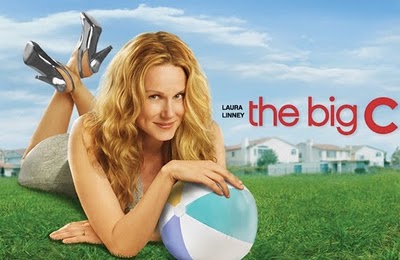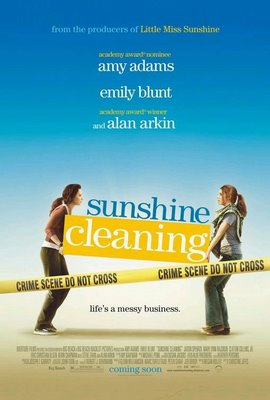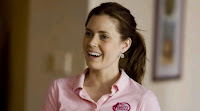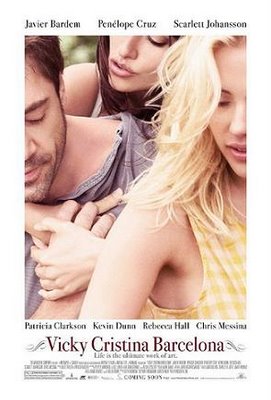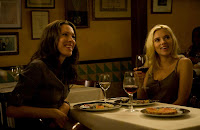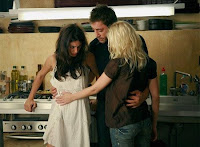The show centers around Cathy (Laura Linney), a middle-aged woman diagnosed with Stage IV melanoma. As of the first five episodes, only her neighbor knows that she has cancer, and she refuses to discuss the issue with her immediate family. It’s easy to identify with Cathy’s unwillingness to open up to her husband, son, and brother about her diagnosis; she’s spent most of her life mothering all of them. She wants to avoid their pity. And she wants to avoid the role reversal of going from caretaker to taken care of.
But the show goes way too far in its depiction of Cathy as a cancer-stricken woman who, instead of undergoing treatment, forgoes it in favor of “grabbing life by the balls” (the show’s actual tagline). The writers make her boringly crazy in her new zest for life: “Look, I’m pouring red wine all over my expensive couch!” … “Look, I’m shooting my son with a paintball gun on his school bus!” … “Look, I’m doing cartwheels!” … “Look, I just stole a live lobster from the restaurant tank!” Worst of all, they make her mean, not in a way that showcases her strength or even her fear, but for sheer “comedic” effect, all the while asking the audience to forgive her for lashing out—remember, she’s got cancer for god’s sake!
Check it:
In the first episode, Cathy, who apparently teaches high school (summer school in this case), fat shames Sidibe’s character, Andrea, in front of the entire class. After Andrea makes a joke about Cathy’s recent unfocused and apathetic attitude toward teaching, Cathy responds with:
You can’t be fat and mean, Andrea … If you’re gonna dish it out, you gotta be able to lick it up. Fat people are jolly for a reason. Fat repels people, but joy attracts them. Now I know everyone’s laughing at your cruel jokes, but nobody’s inviting you to the prom. So you can either be fat and jolly or a skinny bitch. It’s up to you.
Watch the Clip
What gives, Showtime? Are we supposed to laugh our asses off at Andrea’s apparently disgusting fatness? (Admittedly, it’s just hilarious every time Andrea gets caught with another bag of potato chips that Cathy’s forced to take away from her.) Or, do you just want us to feel bad for Cathy for projecting her own desire to be “healthy” onto a young highschooler who has her whole life ahead of her, earnestly telling The Fat Girl, “I just don’t want you to drop dead before you graduate … “? Read: I might have to die young, but I can make sure Andrea doesn’t!
This is all a hoot, really.
And, if I can take this further, Showtime, what are we to make of The Fat Girl’s willingness to put up with Cathy’s behavior toward her? Oh, I forgot—Fat Girls don’t feel the way “regular” people feel; they’re too busy simultaneously pounding milkshakes and scarfing Big Macs to be bothered with the nonsense of experiencing emotions. The Fat Girl’s abysmal self-esteem must not even allow her to fathom standing up for herself, right? Because all Fat Girls deep down hate themselves and sit on the couch binge-eating pizzas, gaining more and more weight, never getting invited to the prom and, therefore, never deserving authentic love (ie, not the charity-case kind) or self-respect.
Or maybe she just wants the $100 for every pound she loses. Thank god for good, old-fashioned motivation wrapped up in a little Fat Hatred, right?
Really, hilarious.
The thing is, this could’ve been an intelligent show, if it weren’t so desperately trying to avoid sentimentality and any hint of darkness. Heather Havrilesky suggests, in her review over at Salon, that perhaps the show’s creator received direction to make the whole thing a little less dark, a little less … “deathy.” She writes:
I’m going to guess that either show creator Darlene Hunt or Laura Linney or both of them were given the following note at some point: “Lighten it up!” Maybe some test audience thought the story was too gloomy, too depressing, too focused on death. “Death? Yuck!” they said. “We don’t want death! We want zany pot-dealer moms who shrug and slurp on frappuccinos! We want zany multiple-personality-disorder moms who shrug and toss back canned beer! We want zany nurse moms who shrug and pop prescription drugs and have affairs with their pharmacist buddies! But zany control-freak moms who shrug and get naked in the back yard, because they’re about to die? No thank you!”
But the strategy to “lighten up this whole Stage IV cancer thing” ultimately fails in its cliche-ridden execution.
The over the top attempt to prevent the audience from getting too bogged down in death gives us Marlene (Phyllis Somerville), Cathy’s feisty old neighbor who refuses to mow her lawn or watch her dog or interact with anyone, blah. It gives us Paul (Oliver Platt), Cathy’s husband, the witty, schlubby yet lovable man-child in constant need of mothering by his wife. It gives us Adam (Gabriel Basso), Cathy’s son, the angsty, video game playing, mother-hating teenage boy who, in one absolutely necessary scene, gets caught masturbating by his mom. It gives us Sean (John Benjamin Hickey), Cathy’s brother—my favorite, really—an eco-extremist who eats leftover food from the garbage, protests gas-guzzling SUVs with a megaphone, refuses to bathe, avoids the dentist (fuck the system, you know?), and deliberately lives as a homeless person because he’s, like, so above the establishment.
(I find Sean particularly problematic because of the unapologetic excess of white, heterosexual, male privilege, as if there aren’t people who actually don’t have the means to go to the dentist, as if millions of people aren’t actually homeless, and, by the way, who don’t also have the convenient luxury of an upper middle class sister showing up every other day with food and clothing and money. See above for previous examples of the man-child.)
Basically, the show wallows in stereotypes but doesn’t take them far enough to make much of a commentary on … anything. I want the show to say something about class issues and privilege. I want the show to say something about the health care system and how financial prosperity, or lack thereof, might impact treatment decisions. I want the show to say something about victim-blaming, about the very real challenges of a woman living with men who don’t respect her, about aging and how it feels to navigate the world in a body deemed less desirable, less able.
But this show wants to laugh at those things: “Look, I’m setting my expensive couch on fire, because I can.” … “Look! I’m paying the workers double to install my swimming pool immediately, because I can.” … “Look! I’m shaming an obese student into losing weight, because I can.” Perhaps what disappoints me most is that the show expects the audience to root for Cathy in all her reckless, carefree, unacknowledged privilege abandon, like, “Look! She’s totally grabbing life by the balls, just like the tagline said she would.”
